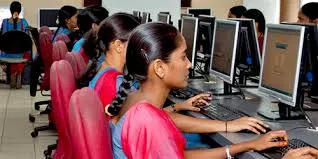Datahalli - a village of data - empowering its women through rural BPO
With The Companies Bill passed last week, the social entrepreneurship industry is hoping to have more support from the corporate world. CSR activities will be impacting the social entrepreneurship industry directly or indirectly. Datahalli, a rural BPO, was started as a project by a corporation and is a self sustained social enterprise today. It was started by JSW Foundation and was the first women-only rural BPO at Vijaynagar, Bellary. In Kannada it means the ‘village of data’.
As part of the CSR initiatives of JSW Foundation, Datahalli started off in 2005 with the intention to give back to the society, especially the women in rural India. The aim was to leverage and capitalize on the latent potential of educated girls in rural India in order to eradicate poverty and empower women. Prior to the setting up of the BPO, rural girls with all the right education and skills were either used for household chores or just married off.
We got in touch with Karmesh Ghosh, who leads the business development at JSoft, the IT arm of JSW group, for its BPO initiatives to know more about Datahalli.

Since 2005, Datahalli has grown to 2 delivery centers—one catering to pure voice based projects and the other being a blended one. Datahalli currently has close to 300 women working across these 2 centers. From working on cheque processing activity for one of the Indian banking companies in 2005 to taking up projects involving xml/html coding, inbound customer services and outbound tele-sales project for raising funds for NGOs, Datahalli has come a long way. Initially funded and created out of JSW Foundation’s CSR initiatives, Datahalli is a self sustaining unit by itself today.
There is a direct impact on the socio-economic well being of the households of the BPO staffers. There is also a sense of dignity and pride that comes in rural population with ITES related employment. Datahalli helps the girls to be self sufficient as even after migrating elsewhere after marriage, the girls can find BPO related jobs anywhere.
The very fact that the girls today are able to interact with overseas clients on the phone, troubleshoot and manage client relationships speaks of the impact created. We have managed to groom and mould rural girls into a force-to- reckon- with ITES workforce with whom the clients are ready to do business.
Currently the rural BPO model is not only accepted well but is also looked upon by various sections of society. The employed girls and their parents are extremely proud to secure a dignified living and improve their livelihoods. From an industry point of view, rural BPO is viewed as a strategic business initiative. Based on current economic scenario and the changing urban landscape, it makes perfect business sense to still go deeper into the hinter-lands for companies to survive and grow organically.
“When we go for new hiring, the enthusiasm and the keenness of the rural girls to learn and work in this environment keeps us motivated and affirms that we are in the right business. This is a complete win-win from an industry perspective as well. The rural population doesn’t get to migrate in search of a job and the industry gets cost effective labor for their projects,” says Karmesh.
Datahalli wants to replicate the same model in more villages to impact more lives and is also ready to consult others who want to embark on a similar path. The challenge in moving up the chain for Datahalli is when they try to explore high end projects. With negligible lead time offered by businesses, they are left high and dry in rural areas where they have to invest time and resources in building the skill set needed. This is where the urban BPOs score over the rural ones. To keep moving up the value chain and grab better and complex projects, Datahalli is investing continuously in its employees to broaden their skill sets and pave the way to transform into a KPO.
Checkout more stories on rural BPO here.






